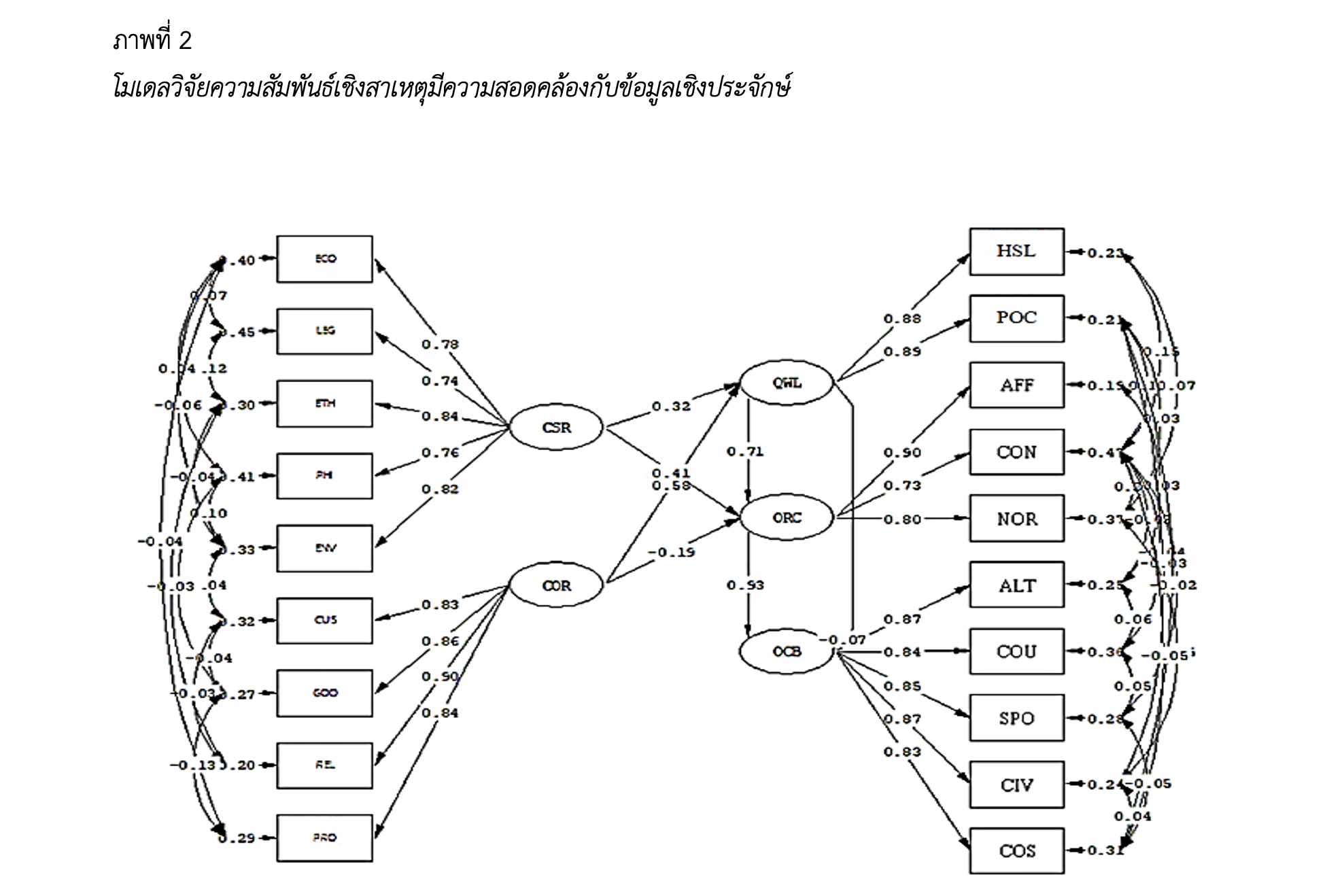รูปแบบความสัมพันธ์เชิงสาเหตุที่เชื่อมโยงความรับผิดชอบต่อสังคม ชื่อเสียงองค์การคุณภาพชีวิตในการทำงาน ความผูกพันต่อองค์การ และพฤติกรรมการเป็นสมาชิกที่ดีมุมมองของพนักงานองค์การธุรกิจอุตสาหกรรมยาแผนปัจจุบันในพื้นที่ระเบียงเศรษฐกิจพิเศษภาคตะวันออกของประเทศไทย
Main Article Content
บทคัดย่อ
การวิจัยมีวัตถุประสงค์เพื่อ 1) ตรวจสอบความสอดคล้องของรูปความสัมพันธ์เชิงสาเหตุกับข้อมูลเชิงประจักษ์ และ 2) ศึกษาอิทธิพลทางตรง อิทธิพลทางอ้อม และอิทธิพลรวมของปัจจัยความรับผิดชอบต่อสังคม และปัจจัยชื่อเสียงองค์การ ที่มีผลต่อพฤติกรรมการเป็นสมาชิกที่ดีพนักงานโดยผ่านคุณภาพชีวิตในการทำงาน และความผูกพันต่อองค์การ มุมมองของพนักงานองค์การธุรกิจอุตสาหกรรมยาแผนปัจจุบันในพื้นที่ระเบียงเศรษฐกิจพิเศษภาคตะวันออกของประเทศไทย โดยใช้การวิจัยเชิงปริมาณเป็นหลัก และใช้เทคนิคการวิจัยเชิงคุณภาพเพื่อสนับสนุนข้อค้นพบ เก็บข้อมูลแบบสอบถามจำนวน 542 คน วิเคราะห์โมเดลสมการโครงสร้าง
ผลการวิจัยพบว่า
1) โมเดลวิจัยความสัมพันธ์เชิงสาเหตุมีความสอดคล้องกับข้อมูลเชิงประจักษ์ 2) ความรับผิดชอบต่อสังคมมีอิทธิพลทางตรงเชิงบวกต่อคุณภาพชีวิตในการทำงาน และความผูกพันต่อองค์การ และมีอิทธิพลทางอ้อมเชิงบวกต่อพฤติกรรมการเป็นสมาชิกที่ดีโดยผ่านคุณภาพชีวิตในการทำงาน และความผูกพันต่อองค์การ อย่างมีนัยสำคัญ และ 3) ชื่อเสียงองค์การมีอิทธิพลทางตรงเชิงบวกต่อคุณภาพชีวิตในการทำงาน และความผูกพันต่อองค์การ และมีอิทธิพลทางอ้อมเชิงบวกต่อพฤติกรรมการเป็นสมาชิกที่ดีโดยผ่านคุณภาพชีวิตในการทำงาน และความผูกพันต่อองค์การอย่างมีนัยสำคัญ ผลการศึกษานี้สามารถให้ข้อมูลอ้างอิงที่เป็นประโยชน์แก่บริษัท บุคคลที่ทำงานในองค์การ และหน่วยงานที่เกี่ยวข้อง
Article Details

อนุญาตภายใต้เงื่อนไข Creative Commons Attribution-NonCommercial-NoDerivatives 4.0 International License.
** ข้อความ ข้อคิดเห็น หรือข้อค้นพบ ในวารสารสหวิทยาการสังคมศาสตร์และการสื่อสารเป็นของผู้เขียน ซึ่งจะต้องรับผิดชอบต่อผลทางกฎหมายใด ๆ ที่อาจเกิดขึ้นจากบทความและงานวิจัยนั้น ๆ โดยมิใช่ความรับผิดชอบของคณะนิเทศศาสตร์ มหาวิทยาลัยราชภัฏรำไพพรรณี **
เอกสารอ้างอิง
สำนักงานคณะกรรมการอาหารและยา. (2561, 25 พฤษภาคม). รายนามสถานที่ผลิตยาแผนปัจจุบันที่ได้มาตรฐานวิธีการที่ดีในการผลิต. http://www.fda.moph.go.th/sites/drug/Post/Shared% 20Documents/Modern_GMP_THAI.pdf
Ahmad, R., Ahmad, S., Islam, T., & Kaleem, A. (2020). The nexus of corporate social responsibility (CSR), affective commitment and organisational citizenship behaviour in academia. Employee Relations: The International Journal, 42(1), 232-247.
Almeida, M. d. G. M. C., & Coelho, A. F. M. (2019). The Antecedents of Corporate Reputation and Image and Their Impacts on Employee Commitment and Performance: The Moderating Role of CSR. Corporate Reputation Review, 22(1), 10-25.
Barakat, S. R., Isabella, G., Boaventura, J. M. G., & Mazzon, J. A. (2016). The influence of corporate social responsibility on employee satisfaction. Management Decision, 54(9), 2325-2339.
Bateman, T. S., & Crant, J. M. (1993). The proactive component of organizational behavior: A measure and correlates. Journal of organizational behavior, 14(2), 103-118.
Beheshtifar, M., & Allahyary, M. H. (2013). Study the relationship among organizational reputation with organizational commitment and employees’ turnover intention. International Research Journal of Applied and Basic Sciences, 6(10), 1467-1478.
Bouraoui, K., Bensemmane, S., Ohana, M., & Russo, M. (2019). Corporate social responsibility and employees’ affective commitment. Management Decision, 57(1), 152-167.
Buchanan, B. (1974). Building Organizational Commitment: The Socialization of Managers in Work Organizations. Administrative science quarterly, 19(4), 533-546.
Carroll, A. B. (1991). The pyramid of corporate social responsibility: Toward the moral management of organizational stakeholders. Business Horizons, 34(4), 39-48.
Carroll, A. B. (1999). Corporate Social Responsibility: Evolution of a Definitional Construct. Business & Society, 38(3), 268-295.
Chaudhary, R., & Akhouri, A. (2019). CSR perceptions and employee creativity: examining serial mediation effects of meaningfulness and work engagement. Social Responsibility Journal, 15(1), 61-74.
Cheasakul, U., & Varma, P. (2016). The influence of passion and empowerment on organizational citizenship behavior of teachers mediated by organizational commitment. Contaduría y Administración, 61(3), 422-440.
Chun, R. (2005). Corporate reputation: Meaning and measurement. International Journal of Management Reviews, 7(2), 91-109.
Hair, J. F., Anderson, R. E., Babin, B. J., & Black, W. C. (2010). Multivariate data analysis: A global perspective (Vol. 7). Pearson Upper Saddle River, NJ.
Kim, H., Woo, E., Uysal, M., & Kwon, N. (2018). The effects of corporate social responsibility (CSR) on employee well-being in the hospitality industry. International Journal of Contemporary Hospitality Management, 30(3), 1584-1600.
Kim, H. L., Rhou, Y., Uysal, M., & Kwon, N. (2017). An examination of the links between corporate social responsibility (CSR) and its internal consequences. International Journal of Hospitality Management, 61(1), 26-34.
Lee, M., & Kim, W. (2013). The Effect of Perceived Corporate Social Responsibility on Hotel Employee’s Attitude and Behavior toward the Organization. International Journal of Tourism Sciences, 13(3), 51-74.
Lee, Y.-W., Dai, Y.-T., & McCreary, L. L. (2015). Quality of work life as a predictor of nurses' intention to leave units, organisations and the profession. Journal of Nursing Management, 23(4), 521-531.
Maslow, A. H. (2017). A Theory of human motivation. Dancing Unicorn Books.
Meyer, J. P., & Allen, N. J. (1991). A three-component conceptualization of organizational commitment. Human resource management review, 1(1), 61-89.
Organ, D. W. (1994). Personality and Organizational Citizenship Behavior. Journal of management, 20(2), 465-478.
Prasetio, A. P., Yuniarsih, T., & Ahman, E. (2017). Job satisfaction, organizational commitment, and organizational citizenship behaviour in state-owned banking. Universal Journal of Management, 5(1), 32-38.
Shanker, M. (2018). Organizational citizenship behavior in relation to employees’ intention to stay in Indian organizations. Business Process Management Journal, 24(6), 1355-1366.
Singhapakdi, A., Lee, D.-J., Sirgy, M. J., & Senasu, K. (2015). The impact of incongruity between an organization's CSR orientation and its employees' CSR orientation on employees' quality of work life. Journal of Business Research, 68(1), 60-66.
Sirgy, M. J., Efraty, D., Siegel, P., & Lee, D.-J. (2001). A New Measure of Quality of Work Life (QWL) Based on Need Satisfaction and Spillover Theories. Social indicators research, 55(3), 241-302.
United Nations Division for Sustainable Development. (1992, 21Decembe). United nations conference on environment & development.
https:// sustainabledevelopment.un.org/content/documents/Agenda21.pdf
Wang, Y. (2015). Examining organizational citizenship behavior of Japanese employees: a multidimensional analysis of the relationship to organizational commitment. The International Journal of Human Resource Management, 26(4), 425-444.


